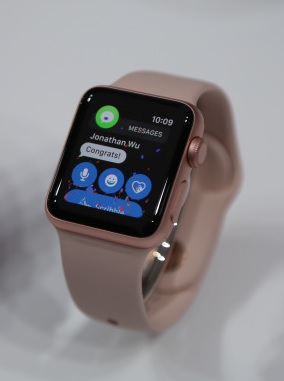
As I mentioned in last week’s post ‘Unbundled Reality and the Anti-Poetry of Pokémon Go‘, I only found out about Pokémon Go a few months ago after it had already taken over the world. The hugely popular reality-enhancement game has been downloaded over 500 million times since its release this summer, bringing in over $10 million a day to the developers. The game enables users to find and capture virtual creatures that have been placed in real-world locations and which are only visible to those with the right electronic devices.
Pokémon in “Real Time”
The Apple watch will give players critical information about Pokémon Go so they don’t even have to check their smart-phones. For example, the watch will alert the wearer when a pokéstop is nearby. It will even inform the wearer when a pokémon appears “in real time.”
“Real time” – what is that? I sometimes imagine going back in history a thousand years and trying to explain to my ancestors about this free-flowing something that is independent from events but which all events participate; this thing that is purely abstract but which we also talk about “keeping”, “losing”, “saving” and “racing against”; this thing that enables us to break our day up into thousands of tiny pieces like glass shattering on rock. Men and women have used time-keeping devices for thousands of years, but before the clock these devices were tied to events in the natural world like the motions of the sun, shadows and seasons. The relationship between time and natural motion oriented men and women to a very different understanding of time than what emerged after the mechanical clock. Historians point out that it was only after the clock that our experience of time became conceptually unbundled from life itself. Prior to the mechanical clock, it was not possible to think of the form of time without thinking about the content of time (the sun, the seasons, the shadows, the natural rhythms of sleeping and waking, etc.).
Although the clock first emerged in the Middle Ages as a tool within monasteries, it wasn’t until the industrial revolution that there was a major impetus for mainstreaming the clock into all of life. For example, scientific management expert Frederick Winslow Taylor (1856–1915) used the clock to standardize factory labor and improve the efficiency of production. However, in so thoroughly fusing men and women’s experience of time with their work, the clock was perceived as un-dignifying and anti-human. For factory workers, the clock was a powerful symbol of the way corporate interests were coming to view work as the primary context in which human experience achieves its meaning.
And now we have the Apple Watch to give us the time. While on one level the impetus behind the Apple Watch Series 2 is very different from the original factory clocks, it may prove to be equally dehumanizing. In so far as the Pokémon interface on the watch thoroughly fuses our experience of time with our experience of play, it serves as a powerful symbol of the way corporate interests are coming to view play as the primary context in which human experience achieves its meaning. But it is a particular type of play in which the human imagination has been mined and co-opted by the software industry, in much the same way that industrialism mined former villagers for factory labor, or the way Facebook mines user preferences for marketing purposes.
Colonizing the Imagination
When play is turned into a commodity, it retains something of its original form, but the form is unbundled from the original context in which it naturally occurs.
There is something very natural about populating the real world with imaginary creatures, as Pokémon Go does. As a boy, I remember creating imaginary creatures to inhabit the world with me. To manage this imaginary landscape required an element of work, especially if others were participating with me. Pokémon Go is also hard work, but the work is not an imaginative task even though it retains some of the raw forms of imaginative acts. Pokémon spoon-feeds us a pre-packaged and artificial creativity designed by software firms. These corporate interests stand to gain by colonizing the very imaginative faculties their products are in the process of destroying. This is similar to the way pornography takes the work out of sex by spoon-feeding us a pre-packaged (and therefore artificial) intimacy with someone else’s body. The corporate interests behind pornography stand to gain by colonizing the very libido their products are destroying.
At first sight, it seems as if those who play Pokémon Go are the colonizers as they capture and train virtual creatures. However, in a bizarre twist the colonizers have become the colonized. Indeed, those who play Pokémon Go participate in their own colonization since their imaginations, environment and even homes are being harvested for the multi-million dollar Pokémon industry. (Did you know there could be a Jigglypuff in your backyard?). Now, thanks to the forthcoming Apple Watch Series 2, even our experience of time can be colonized and integrated into the liturgies of the Pokémon machine.
Further Reading


